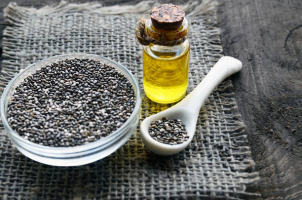Top 7 Health Benefits of Salmon Oil
The greatest benefit of salmon oil is that it is a remarkably potent source of omega-3 fatty acids. Eicosapentaenoic acid (EPA) and docosahexaenoic acid (DHA) ... read more...are the main omega-3 lipids in salmon oil. Research has connected EPA and DHA consumption to a number of health advantages, including a decreased risk of heart disease, enhanced brain function, and decreased inflammation. The most notable health advantages of salmon oil are explored in this article.
-
An essential component of the immune system in your body is the inflammatory response. However, chronic disorders like diabetes and heart disease can develop as a result of excessive inflammation. Omega-3 fats in salmon oil can inhibit your body’s inflammatory response and may help manage symptoms associated with certain inflammatory diseases.
According to research, there are several ways that the omega-3 fats in salmon oil might reduce your body's inflammatory response. It is believed, for example, to lower the amounts of immune cells' production of pro-inflammatory substances. Indeed, several studies have indicated that taking omega-3 supplements may aid in managing the symptoms of certain inflammatory diseases, such as arthritis and heart disease.

Has anti-inflammatory properties 
Has anti-inflammatory properties -
Your blood contains a specific sort of fat called triglycerides. Triglyceride levels that are too high have been linked to a higher risk of heart disease and stroke. Meanwhile, HDL cholesterol, sometimes known as "good" cholesterol, is well known for safeguarding the health of your heart. According to studies, the omega-3 fatty acids in salmon oil may help raise HDL cholesterol and reduce triglycerides.
Consuming up to 9.5 ounces (270 grams) of salmon twice weekly resulted in lower triglyceride levels and higher HDL cholesterol levels, according to a 4-week trial involving 19 individuals. Another research compared the effects of eating salmon to consuming other sources of protein in 92 individuals with high triglycerides and cholesterol. When compared to the men who took alternative protein sources, those who had salmon daily for eight weeks saw significant decreases in triglycerides and significant increases in HDL cholesterol. By increasing the concentration and makeup of lipids in your circulation, salmon oil consumption may improve heart health, according to this data.

May lower triglycerides and improve cholesterol levels 
May lower triglycerides and improve cholesterol levels -
Nitric oxide may be produced by your body from omega-3 lipids found in salmon oil. Nitric oxide encourages blood arteries to relax, which improves blood flow and lowers blood pressure. DHA and EPA, omega-3 fats present in salmon oil, were found to dramatically enhance blood flow and oxygen delivery during exercise in research involving 21 individuals. This was in contrast to those who ingested a different type of oil.
Another small, 6-week trial found that taking daily EPA and DHA supplements increased exercise tolerance and blood flow in participants performing hand-grip exercises compared to a control group. Although these findings are promising, additional research is required to fully comprehend how salmon oil's omega-3 fatty acids might enhance blood flow and athletic performance.

May improve blood flow 
May improve blood flow -
Salmon oil is a good source of omega-3 fatty acids, which are necessary for healthy embryonic development. On tests of cognitive and motor skill development, children born to moms who eat fish or take omega-3 supplements during pregnancy often perform better than kids whose mothers did not.
A decreased incidence of behavioral issues in children is also connected with maternal omega-3 consumption throughout pregnancy and early infancy. According to certain studies, consuming omega-3 fatty acids may help reduce premature births. However, there is conflicting and inconclusive information about this impact.

May support fetal development 
May support fetal development -
Omega-3 fatty acids are clearly necessary for children's brain development. The early results of the study now indicate they could also improve brain health even later in life. One of the omega-3 fats included in salmon oil, DHA, has been linked in test-tube research to the formation and repair of brain cells.
Additionally, enough DHA intake is linked to a lower risk of Alzheimer's disease development and age-related cognitive decline. Additionally, some research on test tubes and animals indicates that consuming omega-3 supplements may aid in the prevention and treatment of Parkinson's disease. Ultimately, additional carefully planned human studies are required to learn more about the potential benefits of omega-3 fatty acids contained in salmon oil for maintaining brain function over the course of human life.

May promote brain health 
May promote brain health -
Your skin and eye health may benefit from consuming enough omega-3 fats, which may be found in foods like salmon oil. Children's healthy eye and visual development are influenced by omega-3 fatty acids. Additionally, increased consumption during the course of adulthood is linked to a lower risk of eye conditions including glaucoma and age-related macular degeneration.
Salmon oil contains omega-3 fatty acids, which have anti-inflammatory properties and also benefit good skin. According to research, ingesting omega-3 fatty acids may prevent sunburn, lessen dermatitis symptoms, and speed up wound healing.

May promote healthy skin and eyes 
May promote healthy skin and eyes -
According to some research, changing your diet to include omega-3 fatty acids from salmon oil as well as other lifestyle choices may help you achieve and maintain a healthy weight. However, the data are inconsistent. According to a number of animal studies, consuming omega-3 supplements may lessen the propensity to store extra body fat.
In a few human trials, taking omega-3 supplements had a comparable impact on body fat storage, lowering it when combined with a low-calorie diet and exercise routine. The majority of this data, nevertheless, comes from trials that lasted for a short while. For a better understanding of how salmon oil affects human obesity and weight control, further long-term study is required.

May aid weight maintenance 
May aid weight maintenance




























